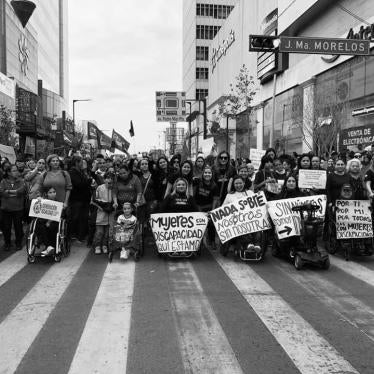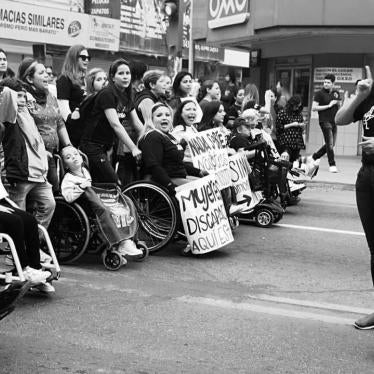Julio Santaella Castell
President of the National Institute for Statistics and Geography
Your Excellency,
Organizations who sign below welcome the consultation process the National Institute for Statistics and Geography is undertaking to discuss the draft executive directive to include disability in the Institute’s surveys and data collection, as well as other government agencies collecting data on disability.
We believe these changes have the potential to be an important instrument to obtain disaggregated data on disability and other thematic issues that are covered by the work of the Institute.
However, we are concerned that the Institute’s current consultation process has not taken into consideration the standards set forth by international human rights law when consulting organizations of people with disabilities. The process should be improved to include perspectives of people with disabilities, including by ensuring that all information about the directive and the process for consultation is accessible and that mechanisms for providing input are also accessible to people with different types of disabilities. We also urge the Institute to allow sufficient time for meaningful participation not limited to a virtual forum.
Article 31 of the Convention on the Rights of Persons with Disabilities, ratified by Mexico in November 2007, requires states party to “collect appropriate information, including statistical and research data, to enable them to formulate and implement policies” to implement the convention. Article 4.3 of the treaty establishes the obligation to “closely consult with and actively involve persons with disabilities, including children with disabilities, through their representative organizations” in decision-making processes concerning issues related to people with disabilities. The latter obligation is relevant to the consultations around the draft executive directive and data collection about disability.
The Committee on the Rights of Persons with Disabilities, which is responsible for monitoring the implementation of the CRPD and providing authoritative interpretation of its obligations, has established clear standards for consultations to be inclusive of people with disabilities. It states that “procedures and related materials should be inclusive of and accessible to persons with disabilities and include time frames and technical assistance for early involvement in consultation processes.”[1] It also specifies, “The views of persons with disabilities, through their representative organizations, should be given due weight. States parties should guarantee that they are not only heard as a mere formality or as a tokenistic approach to consultation. States parties should take into account the results of such consultations and reflect them in the decisions adopted, by duly informing participants of the outcome of the process.”[2]
The CRPD provides guidance on accessible formats in communications. These include: “languages, display of text, Braille, tactile communication, large print, accessible multimedia as well as written, audio, plain-language, human-reader and augmentative and alternative modes, means and formats of communication, including accessible information and communication technology.”[3]
Our specific recommendations to ensure the consultation process on the draft executive directive is inclusive of people with disabilities, consistent with the CRPD, include:
- Extend the timeframe for the consultation beyond the current July 30 deadline, giving due consideration to the fact that many organizations of people with disabilities work with volunteers and might need supplementary time to provide input.
- Ensure accessible information about the directive and the consultation process. This should include accessible digital formats on the Institution’s website as well as written information available in easy-to-read and clear language, braille, and tactile communication. This should also include reasonable accommodations when needed.
- Ensure meaningful participation of people with disabilities. Make every effort to contact all organizations of persons with disabilities in Mexico to share the relevant information about the directive and the consultation process. Ensure that mechanisms for providing input are accessible to people with different disabilities. Allow for a reasonable timeline to ensure organizations for persons with disabilities can provide proper feedback through accessible channels, including through remote webinars or in-person meetings consistent with relevant Covid-19 public health protocols. Consultation processes need to take into consideration that many people with disabilities in Mexico have no access to the internet.
- Consult with children and adolescents. Since the executive directive will also include regulations on children and adolescents with disabilities, adequate and meaningful consultations should also be carried out with this population, respecting the principles of progressive autonomy and the best interests of the child.
- Consult with people under any form of guardianship or who are institutionalized. Consultations should also be carried out among those people with disabilities who are under any form of guardianship or who are institutionalized, including older persons, through organizations that protect their rights. For such purposes, accessible mechanisms should be provided to facilitate these people expressing their views, including the possibility of making mechanisms available for supported decision-making.
- Provide information on the results of the consultation. Update the organizations of persons with disabilities on the results of the consultation, in particular by providing a clear explanation, in an understandable, easy-to-read format, of the conclusions, considerations, and rationale for decisions on how their opinions were taken into account and why.
We would be grateful if you could respond to our letter and recommendations by July 16,2021.
Libertad Hernandez
Dis-capacidad.com
Ilse Rebeca Gutiérrez Ramírez
SinColectivo, agrupación plural mexicana de Personas Expertas por Experiencia y activistas en discapacidad psicosocial y Cultura Loca.
Manuel Alexandro Martínez Pérez
Marco Antonio Vargas Solis
Catalina Torres Cuevas
Centro de Investigación y Servicios de Educación Especial, A. C
Fundación para la inclusión y desarrollo de personas con discapacidad, A.C.
Reyna Guadalupe Sumano Alegría
Katia D’Artigues
Yo También, A.C.
Miguel Chavez Benitez
Andrea Acosta Barcenas
José Munive
Isabel Alondra Peñaloza Cruz
María Teresa Fernández Vázquez
Entropía Social, A.C.
Literacy for the Deaf, Mexico
Asela Lopez
Allison Tovar Hernández
Roberto René Pinto Rojas
Mi vida en muletas
Justino Vidal Vargas Solís
Ángela Salazar
Colectivo Universidad Incluyente
Pedro Cabañas Laurel
Fernanda Ríos Meza
La visión del silencio
"Institución CONFE a Favor de la Persona con Discapacidad Intelectual, I. A. P."
Margarita Garifas
Familias y Retos Extraordinarios AC
Mily Cruz Diaz
Familias y Retos Extraordinarios AC
Mauricio Moyssén Chávez
Seminario de Arquitectura y Diseño Incluyentes, Facultad de Arquitectura, UNAM
CENTRO DE ATENCION INFANTIL PIÑA PALMERA, A.C.
Eréndira Cuevas Arellano
Surfeando Sonrisas
Centro integral de rehabilitación infantil A. C.
Human Rights Watch








